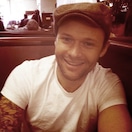Patrick Watson is a big science fiction guy. Androids, alternate futures, Asimov — all of it.
“It’s my biggest inspiration and I’ve never done a record like that,” he says, sounding somewhat surprised. “When I finished my last record, [2012’s Adventures in Your Own Backyard], I thought it was absurd, so I thought I should at least do one science fiction album, just for fun.”
The result is Love Songs for Robots, the Polaris Prize winner’s fifth album, which is available May 12 from Secret City records and streaming above for one week.
Despite the title, Love Songs is less about actual robots and more about the way science fiction acts as a means to make us ask bigger picture questions.
“Good science fiction isn’t CGI stuff, it’s the stuff that pulls bizarre strings in you,” he says.
Watson was also interested in the relationship between genuine inspiration and our more mechanical responses, which musically ended up being about the interaction between analogue and electronic instruments.
And Blade Runner.
“I’ll usually make movies in my head when I’m writing, and for this one, I had Blade Runner,” he says, clarifying that he used it not to inspire lyrics, but more for the general tone and mood of the album. "Still to this day, if you listen to that film score, you won't find any electronic music that has captured the warmth in Vangelis' synths. He's a magician. It never feels electronic or cold."
It would be fair to say that Watson, also a composer of film scores, accomplished a similar feat on Love Songs. Synths rise and fall in the mix, swirling around and blending with the piano and Watson’s soft, windy vocals. It's both the bleeding soul of a singer-songwriter and the more mechanical electronic textures of sample pads and synths, without one overpowering the other.
To help channel their inner Vangelis, Watson and the band (Joe Grass on guitars, Robbie Kuster on drums/percussion and Mishka Stein on bass) went so far as to record four songs at the storied Capitol Records in L.A., where they were able to use the same synths that the influential composer used on the Blade Runner soundtrack.
“Capitol was like walking into a museum of old recording equipment that is still in mint condition,” he says. “Bands will all talk about how having fancy stuff helps, whether we mean it or not, but then when you have these 70-year-old pre-amps in mint condition, there is just nothing that compares… It felt a bit magical for us. We went there for a joke at first, took three days and thought, once in our life, let’s record in one of these studios so we know what it's like. It would be a nice memory for us.”
Armed with all the samples and tones they would need so that Kuster could trigger them on the sample pad (including some heavy hip-hop kicks and snares), they were able to record four songs in three days, live off the floor.
“We had built the language ahead of time, then we just went to the studio and spoke it,” he says, adding that being in the same studio as legendary artists like Nat King Cole, Frank Sinatra and the Beach Boys gave them extra inspiration (Brian Wilson was even recording there at the same time, and the band was allowed to hear the multi-track recordings of Pet Sounds live from the board).
“When you take your take, you really mean it,” he says. “You feel honoured to be there, and it's a privilege, so when you're singing on Frank Sinatra's microphone, chances are you're going to sing a little better just because you don’t want to be an ass.”
Love Songs for Robots is available May 12. Pre-order it on iTunes.
Follow Jesse Kinos-Goodin on Twitter: @JesseKG

